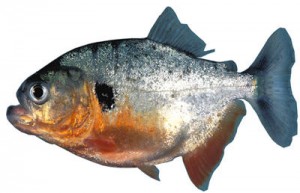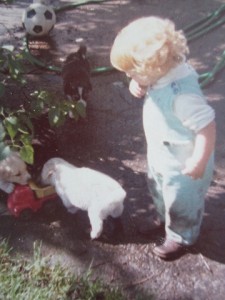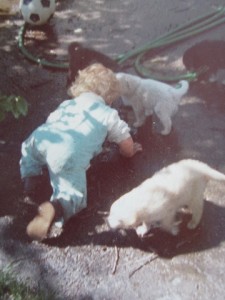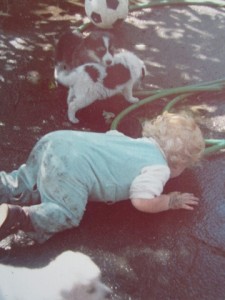Having been raised by a “yes-mom,” I wanted to be one too, but sometimes that got me into trouble. Like the time I agreed to let Louisa own a couple of piranhas. But my “yes” was for a good reason: a school science project. Her plan was to see if piranhas were as ferocious as everyone said they were, by watching and charting their eating habits.
We went to the local fish store, and the proprietor led us to a divided tank where two piranhas lived. While he netted and bagged them, Louisa and I listened to his fish stories, which were entertaining until he stuck his finger in front of our noses and said, “See this big notch? A piranha tried to eat me once.”
But Louisa’s two fish were already bagged, so with wide eyes, we left the store.
Apparently piranhas will eat anything, gobbling up other fish, plants, whatever looks tasty. They’ll even attack prey larger than they are, including (gulp) humans, if they have the chance.
Louisa faithfully fed her piranhas by adding several goldfish to the tank each day, careful not to get too close when she did, and little by little, the goldfish disappeared. It was impossible to watch the piranhas eating them, though, since they wouldn’t dine while she was in the room. Eventually she left a video camera running and did catch them eating, on film. The camera, however, couldn’t detail the lightning fast attack-and-gulp of those piranhas. Each kill happened in a split second.
Louisa’s piranha project didn’t yield too much scientific data, but it did deliver an unexpected conclusion. A few days after she had stopped taping, she walked into her room and saw that one piranha had eaten the other.
These fish have insatiable appetites, along with strong determination to satisfy them, no matter what. Sadly, we humans often operate the same way, going to great lengths to satisfy our desires, and I don’t mean just with food but in all categories. Walking that center line between wanting something good and pursuing too much of it is a difficult place to live, but that’s usually the exact spot where God wants us. The question is, why?
Maybe he’s assigned us the difficult job of setting limits for ourselves so we’ll have repeated opportunities to be victorious. Then, as we’re willing to work on it, he roots for us, offering help along the way and hoping we’ll succeed.
After Louisa’s science fair ended (without a blue ribbon), she had wanted to keep the remaining piranha as a pet, but I was nervous about housing such a vicious animal. So we brought him back to the store, for lack of any other ideas of how to get rid of him. The guy took one look and said, “Whoa! How much did you feed this guy? He’s 4 times bigger than he should be!”
And I guess that’s a good reminder that giving in to big appetites only leads to bigger ones.
“Each person is tempted when he is lured and enticed by his own desire. [God] tempts no one.” (James 1:14,13)








